
leek-wars
Leek Wars, the multiplayer web browser AI programming game in which you train leeks
Stars: 157
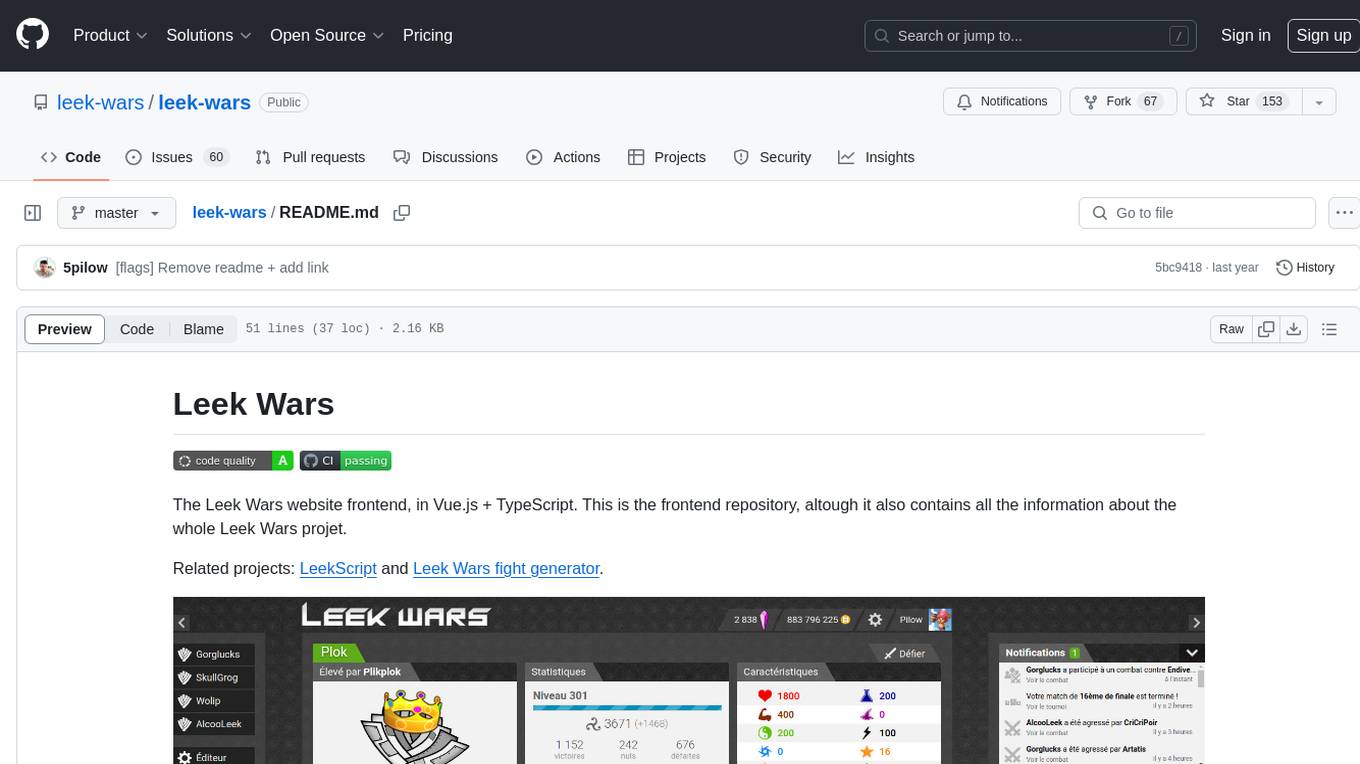
The Leek Wars website frontend, in Vue.js + TypeScript. This repository contains all the information about the whole Leek Wars project. It is easy to install and deploy, but be careful as it is connected to the production server. Accepts pull requests and uses various libraries like Vue.js, Vuex, CodeMirror, Chartist, Katex, and Flags. Connect with Leek Wars on Twitter, Facebook, and GitHub. Distributed under the GPL3 license.
README:
The Leek Wars website frontend, in Vue.js + TypeScript. This is the frontend repository, altough it also contains all the information about the whole Leek Wars projet.
Related projects: LeekScript and Leek Wars fight generator.
The project is very easy to install and deploy in 10s:
git clone https://github.com/leek-wars/leek-wars.git
cd leek-wars
npm i
npm startThen go to localhost:8080 in your browser.
Be careful, this project is only the front end of Leek Wars, so it's connected to the production server. When you log into this local version, you will use your real account!
- Client : this repository
- Generator : https://github.com/leek-wars/leek-wars-generator
- LeekScript : https://github.com/leek-wars/leekscript
I gladly accept pull requests to Leek Wars. Before starting work on a feature, see the contribution guidelines.
- Vue.js https://github.com/vuejs/vue
- Vuex https://github.com/vuejs/vuex
- CodeMirror https://github.com/codemirror/codemirror
- Chartist https://github.com/gionkunz/chartist-js
- Katex https://github.com/Khan/KaTeX
- Flags https://github.com/hampusborgos/country-flags
- Twitter : https://twitter.com/LeekWars
- Facebook : https://www.facebook.com/LeekWars/
- GitHub (this repo) : https://github.com/leek-wars/leek-wars
Distributed under the GPL3 license. Copyright (c) 2016-2023, Pilow
For Tasks:
Click tags to check more tools for each tasksFor Jobs:
Alternative AI tools for leek-wars
Similar Open Source Tools

leek-wars
The Leek Wars website frontend, in Vue.js + TypeScript. This repository contains all the information about the whole Leek Wars project. It is easy to install and deploy, but be careful as it is connected to the production server. Accepts pull requests and uses various libraries like Vue.js, Vuex, CodeMirror, Chartist, Katex, and Flags. Connect with Leek Wars on Twitter, Facebook, and GitHub. Distributed under the GPL3 license.

agentcloud
AgentCloud is an open-source platform that enables companies to build and deploy private LLM chat apps, empowering teams to securely interact with their data. It comprises three main components: Agent Backend, Webapp, and Vector Proxy. To run this project locally, clone the repository, install Docker, and start the services. The project is licensed under the GNU Affero General Public License, version 3 only. Contributions and feedback are welcome from the community.

chainlit
Chainlit is an open-source async Python framework which allows developers to build scalable Conversational AI or agentic applications. It enables users to create ChatGPT-like applications, embedded chatbots, custom frontends, and API endpoints. The framework provides features such as multi-modal chats, chain of thought visualization, data persistence, human feedback, and an in-context prompt playground. Chainlit is compatible with various Python programs and libraries, including LangChain, Llama Index, Autogen, OpenAI Assistant, and Haystack. It offers a range of examples and a cookbook to showcase its capabilities and inspire users. Chainlit welcomes contributions and is licensed under the Apache 2.0 license.
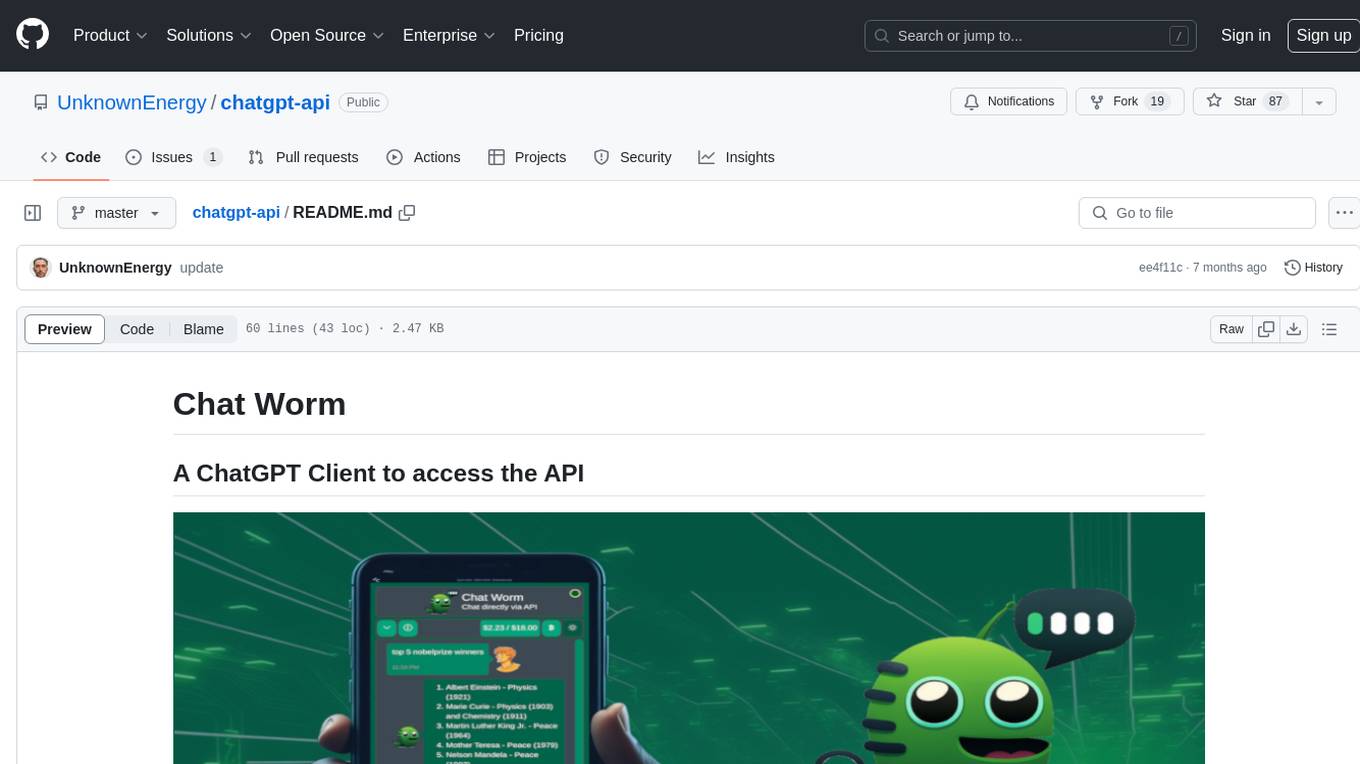
chatgpt-api
Chat Worm is a ChatGPT client that provides access to the API for generating text using OpenAI's GPT models. It works as a single-page application directly communicating with the API, allowing users to interact with the latest GPT-4 model if they have access. The project includes web, Android, and Windows apps for easy access. Users can set up local development, contribute improvements via pull requests, report bugs or request features on GitHub, deploy to production servers, and release on different app stores. The project is licensed under the MIT License.

gpt4all
GPT4All is an ecosystem to run powerful and customized large language models that work locally on consumer grade CPUs and any GPU. Note that your CPU needs to support AVX or AVX2 instructions. Learn more in the documentation. A GPT4All model is a 3GB - 8GB file that you can download and plug into the GPT4All open-source ecosystem software. Nomic AI supports and maintains this software ecosystem to enforce quality and security alongside spearheading the effort to allow any person or enterprise to easily train and deploy their own on-edge large language models.
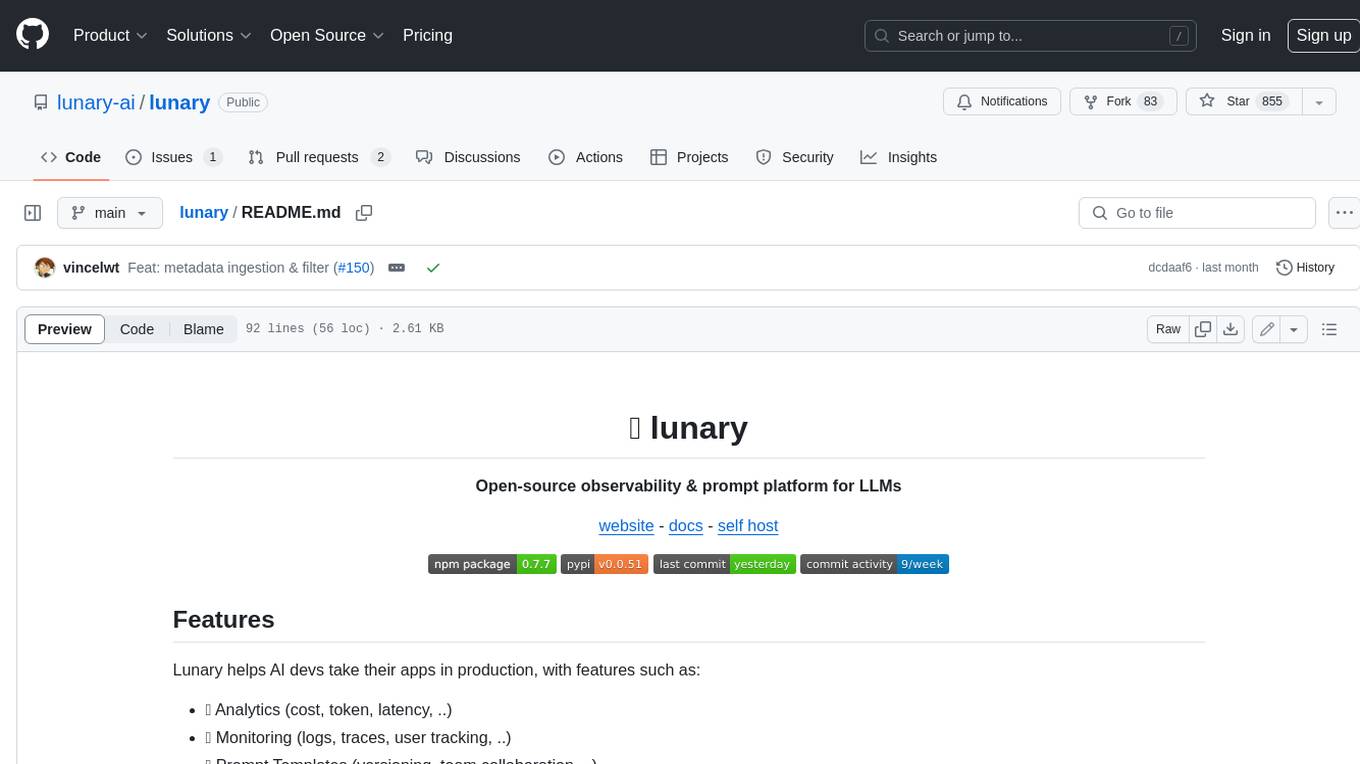
lunary
Lunary is an open-source observability and prompt platform for Large Language Models (LLMs). It provides a suite of features to help AI developers take their applications into production, including analytics, monitoring, prompt templates, fine-tuning dataset creation, chat and feedback tracking, and evaluations. Lunary is designed to be usable with any model, not just OpenAI, and is easy to integrate and self-host.
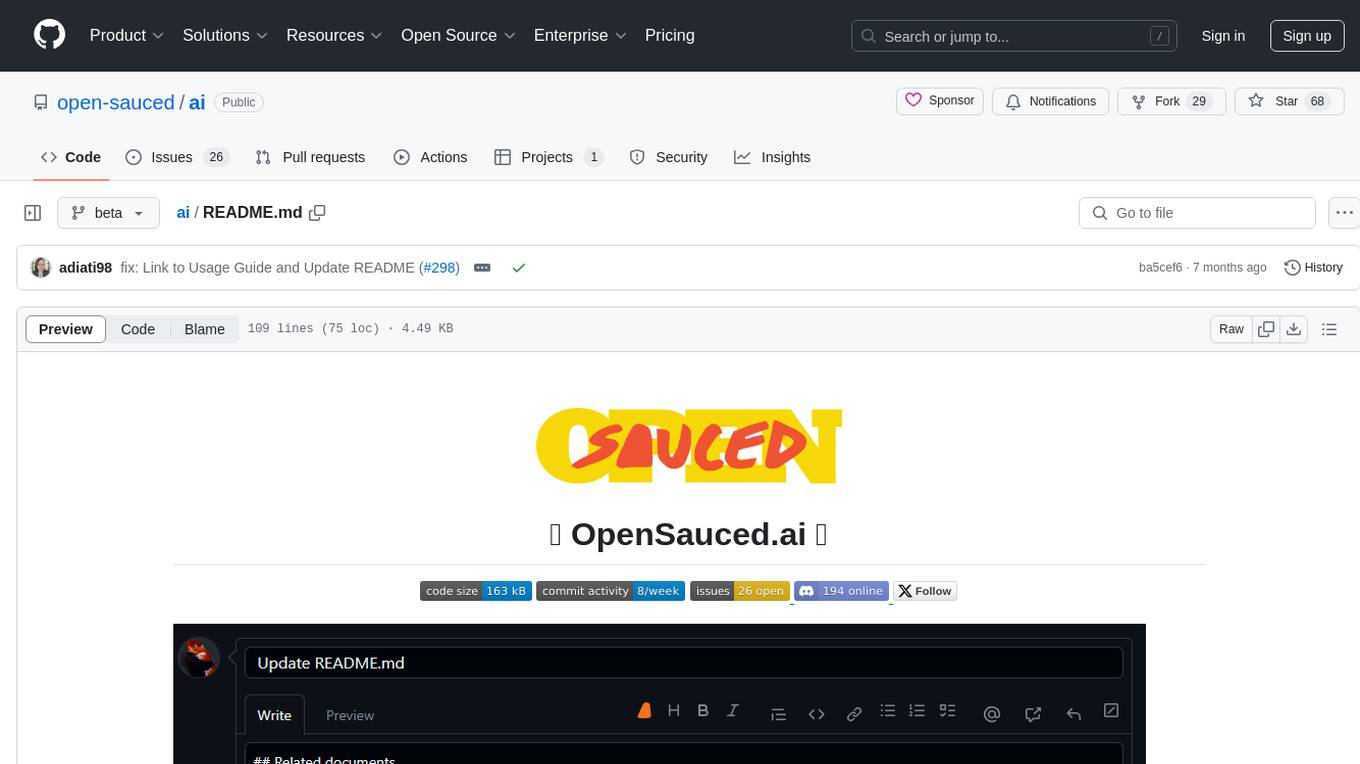
ai
Leverage AI to generate pull request descriptions based on the diff & commit messages. Install the Chrome Extension to get started. The project uses Node.js and NPM. It provides developer documentation and usage guide. The extension can be installed on Chromium-based browsers by loading the unpacked `dist` directory. The core team includes Brian Douglas, Divyansh Singh, and Anush Shetty. Contributors can open issues and find good first issues in the Discord channel. The project uses @open-sauced/conventional-commit for commit utility and semantic-release for generating changelogs and releases. Join the community in Discord, watch videos on the YouTube Channel, and find resources on the Dev.to org. Licensed under MIT © Open Sauced.
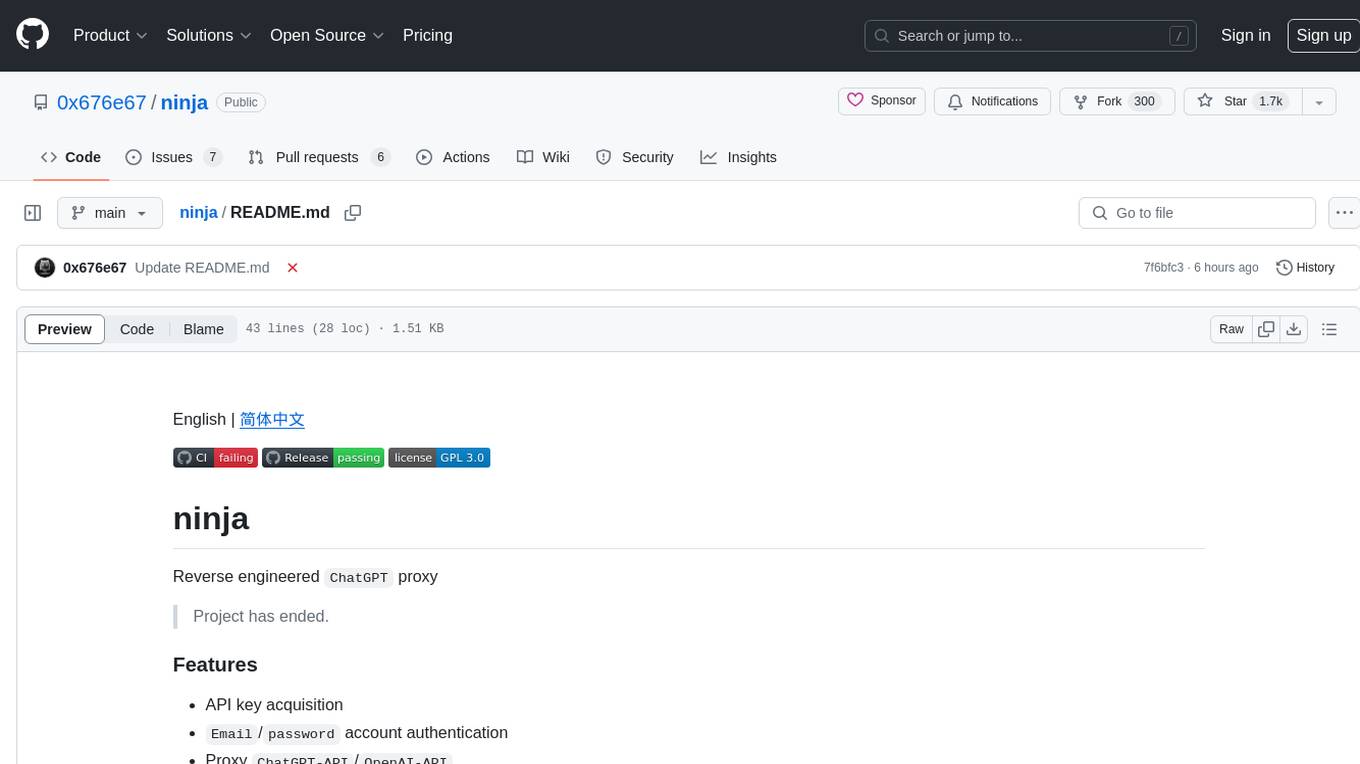
ninja
Ninja is a project that serves as a reverse engineered proxy for ChatGPT. It allows users to acquire API keys, authenticate using email/password, proxy ChatGPT-API/OpenAI-API, access ChatGPT WebUI, utilize IP proxy pool, and solve FunCaptcha with Capsolver.com. The project has a very small memory footprint and is designed for ease of use. Please note that the project has ended.
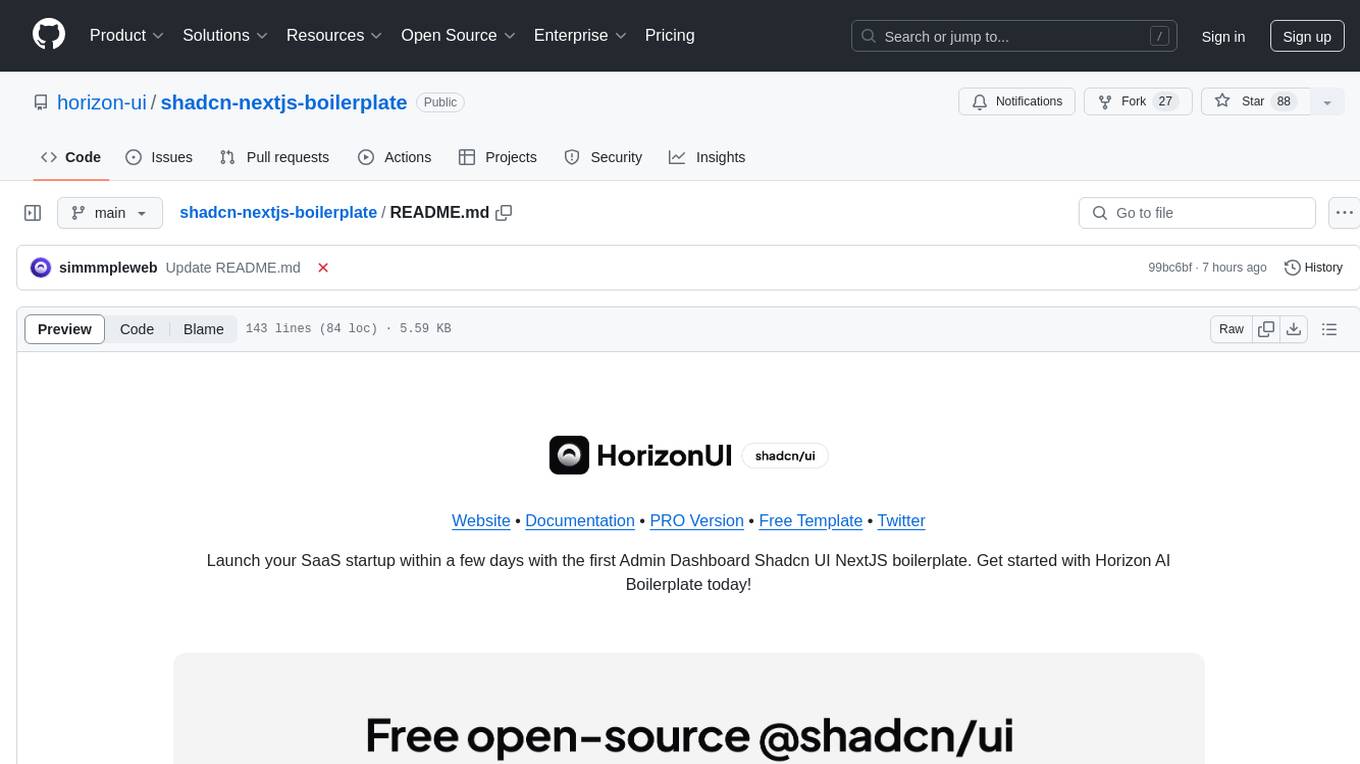
shadcn-nextjs-boilerplate
Horizon AI Boilerplate is an open-source Admin Dashboard template designed for Shadcn UI, NextJS, and Tailwind CSS. It provides over 30 dark/light frontend elements for creating Chat AI SaaS Apps quickly. The documentation is detailed and complex, guiding users through installation and usage. Users can start their local server with simple commands. The tool requires a valid OpenAI API key for ChatGPT functionality. Additionally, a Figma version is available for design purposes. The PRO version offers more components and pages. Users can report issues on GitHub and connect with the community via Discord. The tool credits open-source resources like Shadcn UI Library, NextJS Subscription Payments, and ChatBot UI by mckaywrigley.
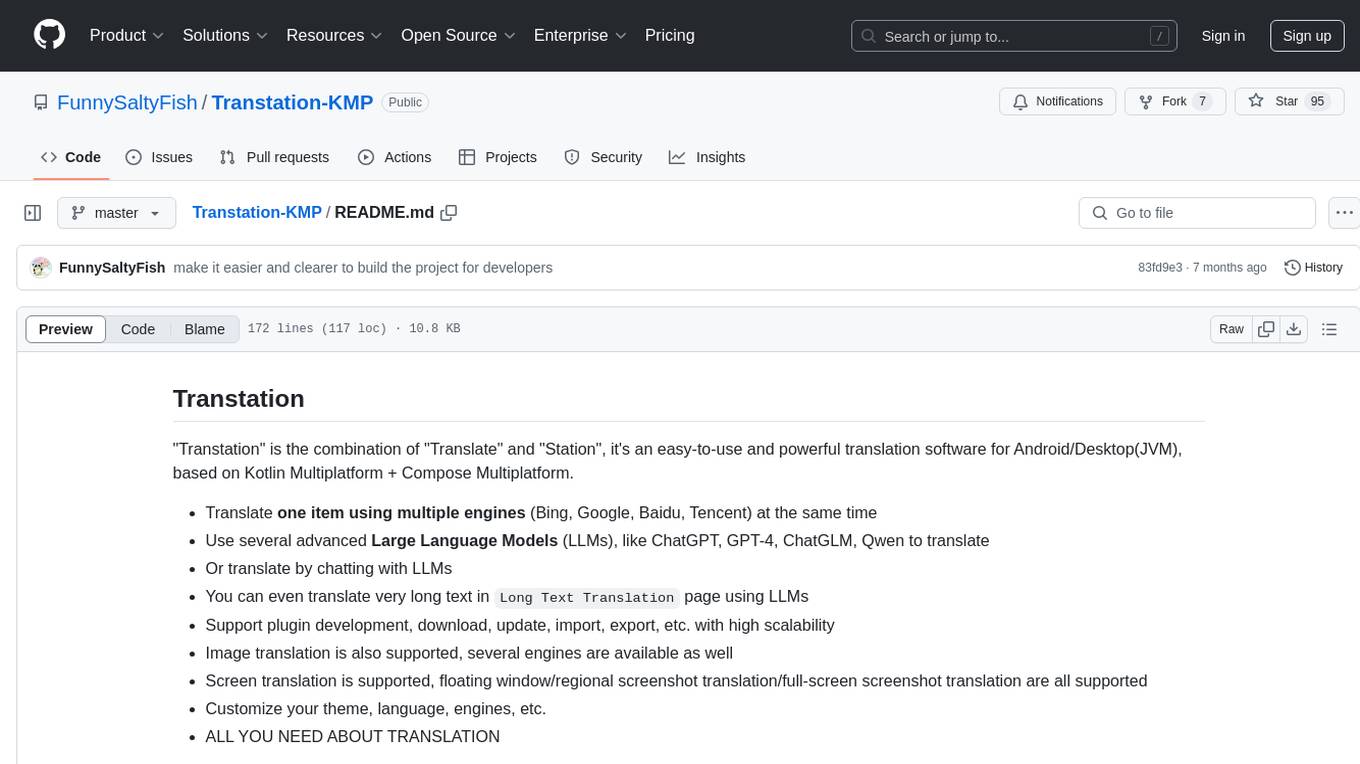
Transtation-KMP
Transtation is an easy-to-use and powerful translation software for Android/Desktop based on Kotlin Multiplatform + Compose Multiplatform. It allows users to translate one item using multiple engines simultaneously, utilize advanced Large Language Models for translation, chat with LLMs for translation, translate long text, support plugin development, image translation, and screen translation. The application is designed for Chinese users and serves as a reference for learning Jetpack Compose or Compose Multiplatform. It features Kotlin Multiplatform, Compose Multiplatform, MVVM, Kotlin Coroutine, Flow, SqlDelight, synchronized translation with multiple engines, plugin development, and makes use of Kotlin language features like lazy loading, Coroutine, sealed classes, and reflection. The application gradually adapts to Android13 with features like setting application language separately and supporting Monet icon.

eidos
Eidos is an extensible framework for managing personal data in one place. It runs inside the browser as a PWA with offline support. It integrates AI features for translation, summarization, and data interaction. Users can customize Eidos with Prompt extension, JavaScript for Formula functions, TypeScript/JavaScript for data processing logic, and build apps using any framework. Eidos is developer-friendly with API & SDK, and uses SQLite standardization for data tables.

botpress
Botpress is a platform for building next-generation chatbots and assistants powered by OpenAI. It provides a range of tools and integrations to help developers quickly and easily create and deploy chatbots for various use cases.
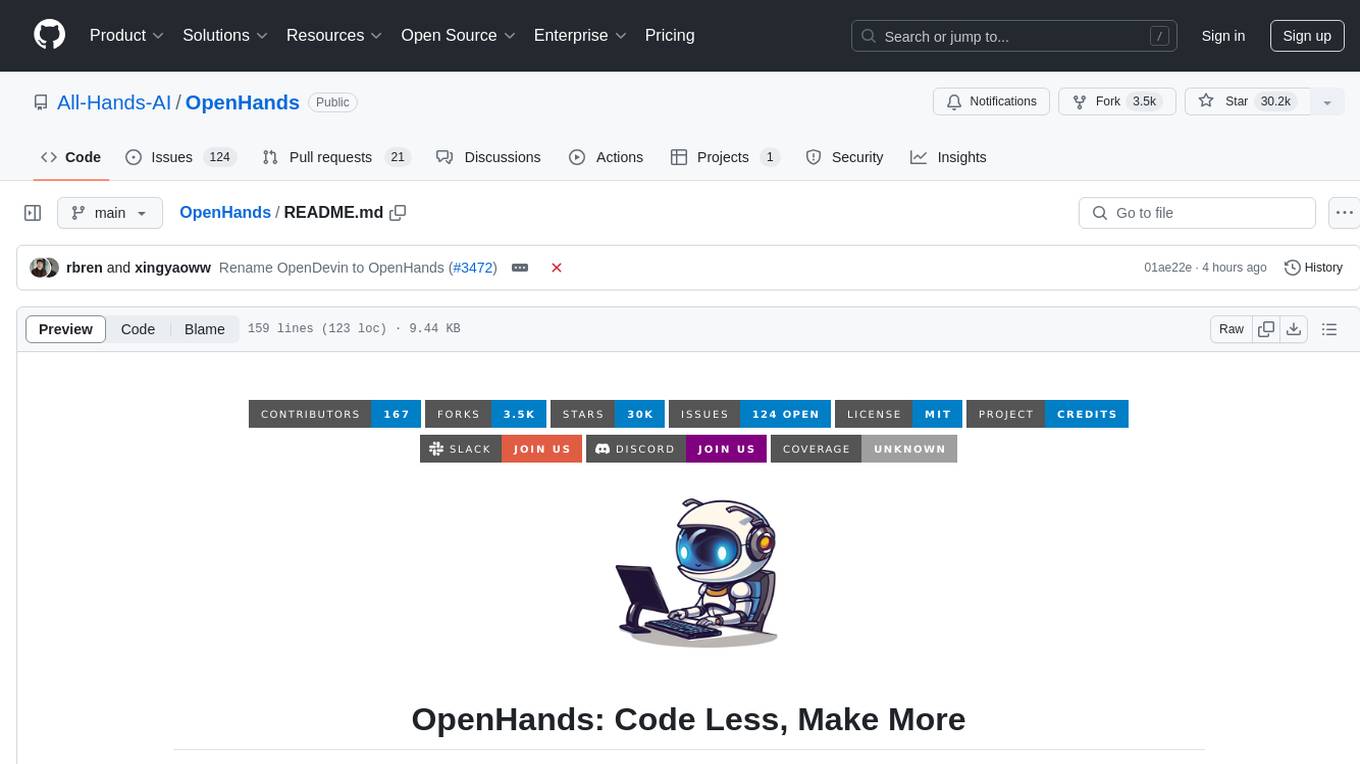
OpenHands
OpenDevin is a platform for autonomous software engineers powered by AI and LLMs. It allows human developers to collaborate with agents to write code, fix bugs, and ship features. The tool operates in a secured docker sandbox and provides access to different LLM providers for advanced configuration options. Users can contribute to the project through code contributions, research and evaluation of LLMs in software engineering, and providing feedback and testing. OpenDevin is community-driven and welcomes contributions from developers, researchers, and enthusiasts looking to advance software engineering with AI.
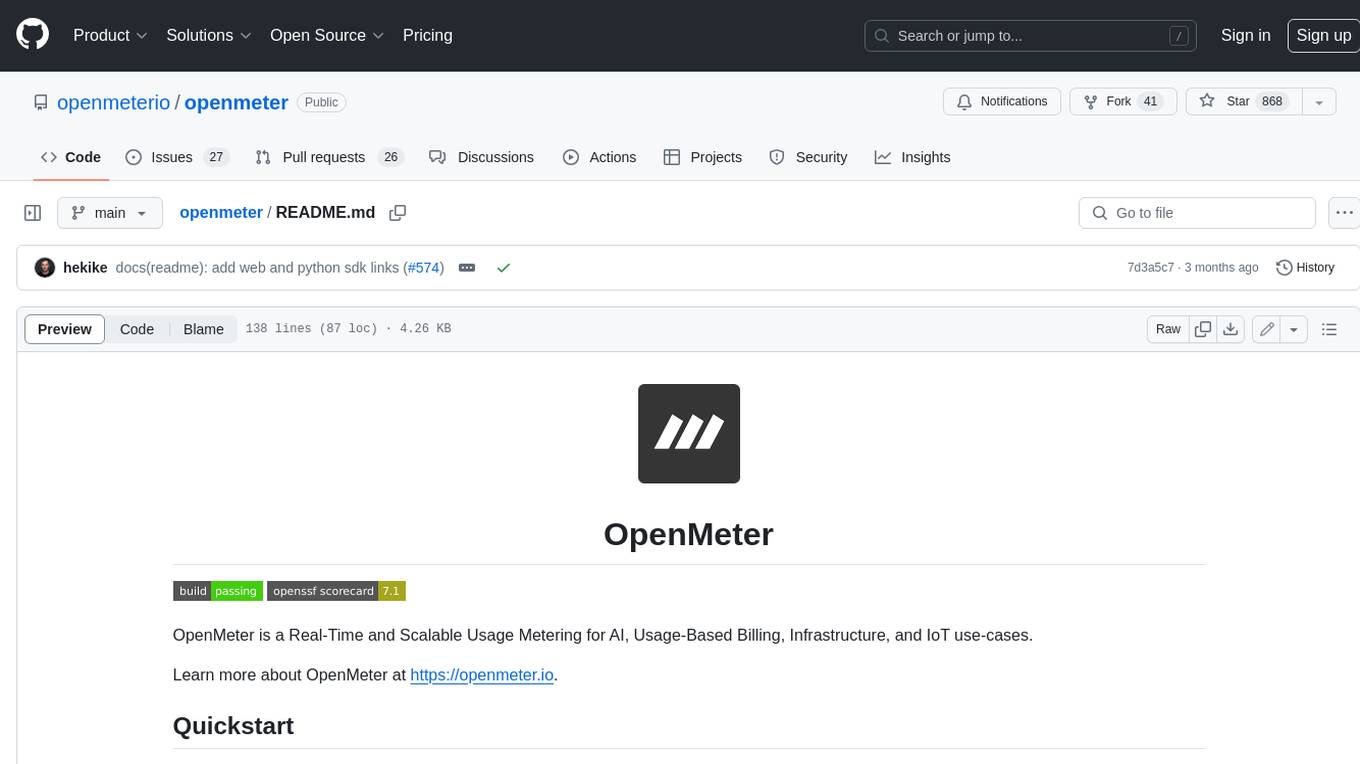
openmeter
OpenMeter is a real-time and scalable usage metering tool for AI, usage-based billing, infrastructure, and IoT use cases. It provides a REST API for integrations and offers client SDKs in Node.js, Python, Go, and Web. OpenMeter is licensed under the Apache 2.0 License.
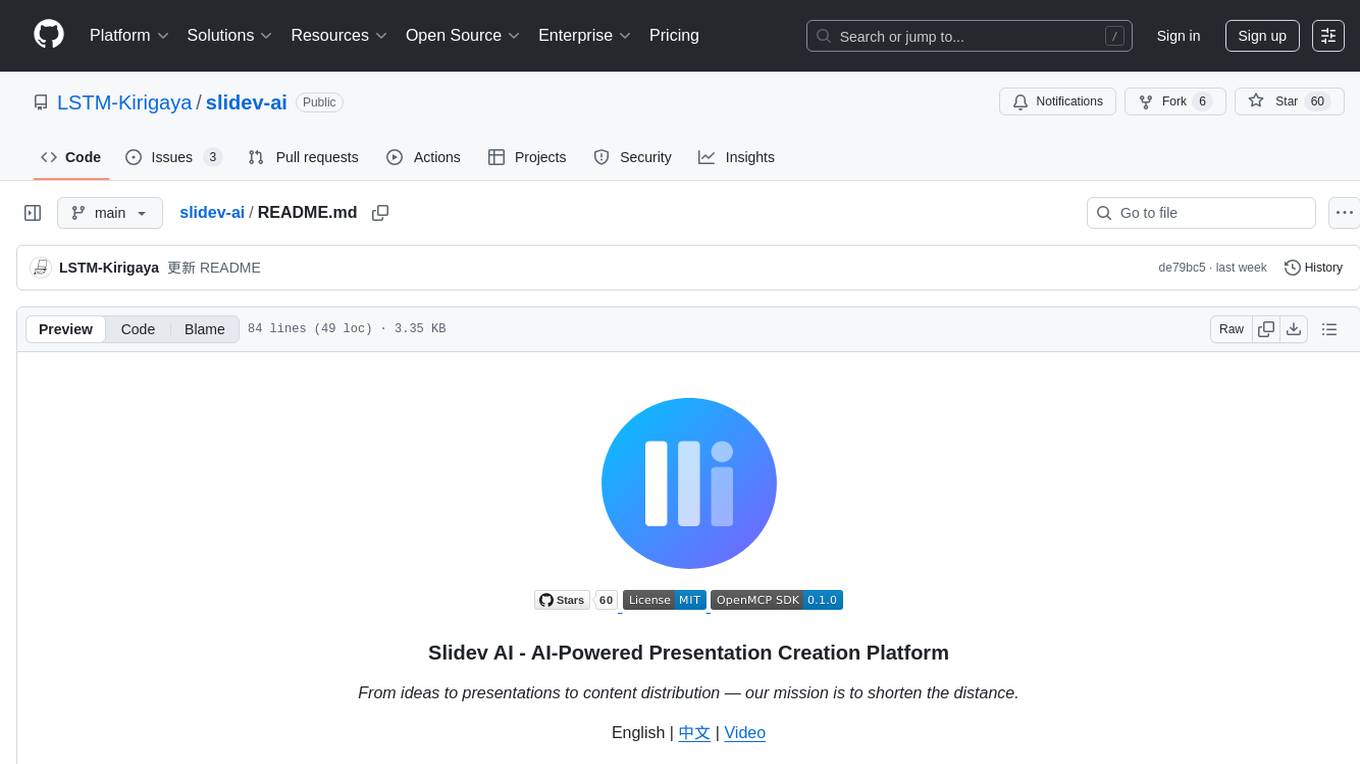
slidev-ai
Slidev AI is a web app that leverages LLM (Large Language Model) technology to make creating Slidev-based online presentations elegant and effortless. It is designed to help engineers and academics quickly produce content-focused, minimalist PPTs that are easily shareable online. This project serves as a reference implementation for OpenMCP agent development, a production-ready presentation generation solution, and a template for creating domain-specific AI agents.
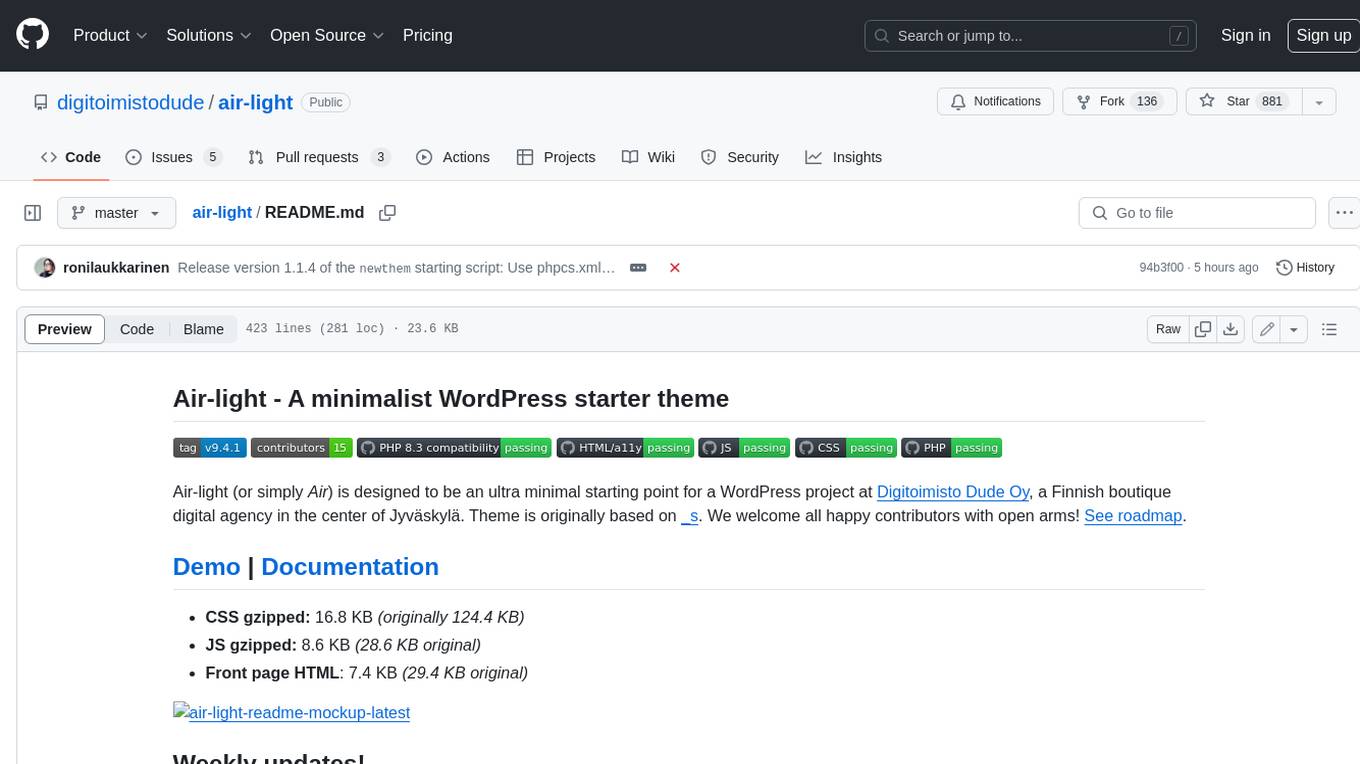
air-light
Air-light is a minimalist WordPress starter theme designed to be an ultra minimal starting point for a WordPress project. It is built to be very straightforward, backwards compatible, front-end developer friendly and modular by its structure. Air-light is free of weird "app-like" folder structures or odd syntaxes that nobody else uses. It loves WordPress as it was and as it is.
For similar tasks

leek-wars
The Leek Wars website frontend, in Vue.js + TypeScript. This repository contains all the information about the whole Leek Wars project. It is easy to install and deploy, but be careful as it is connected to the production server. Accepts pull requests and uses various libraries like Vue.js, Vuex, CodeMirror, Chartist, Katex, and Flags. Connect with Leek Wars on Twitter, Facebook, and GitHub. Distributed under the GPL3 license.
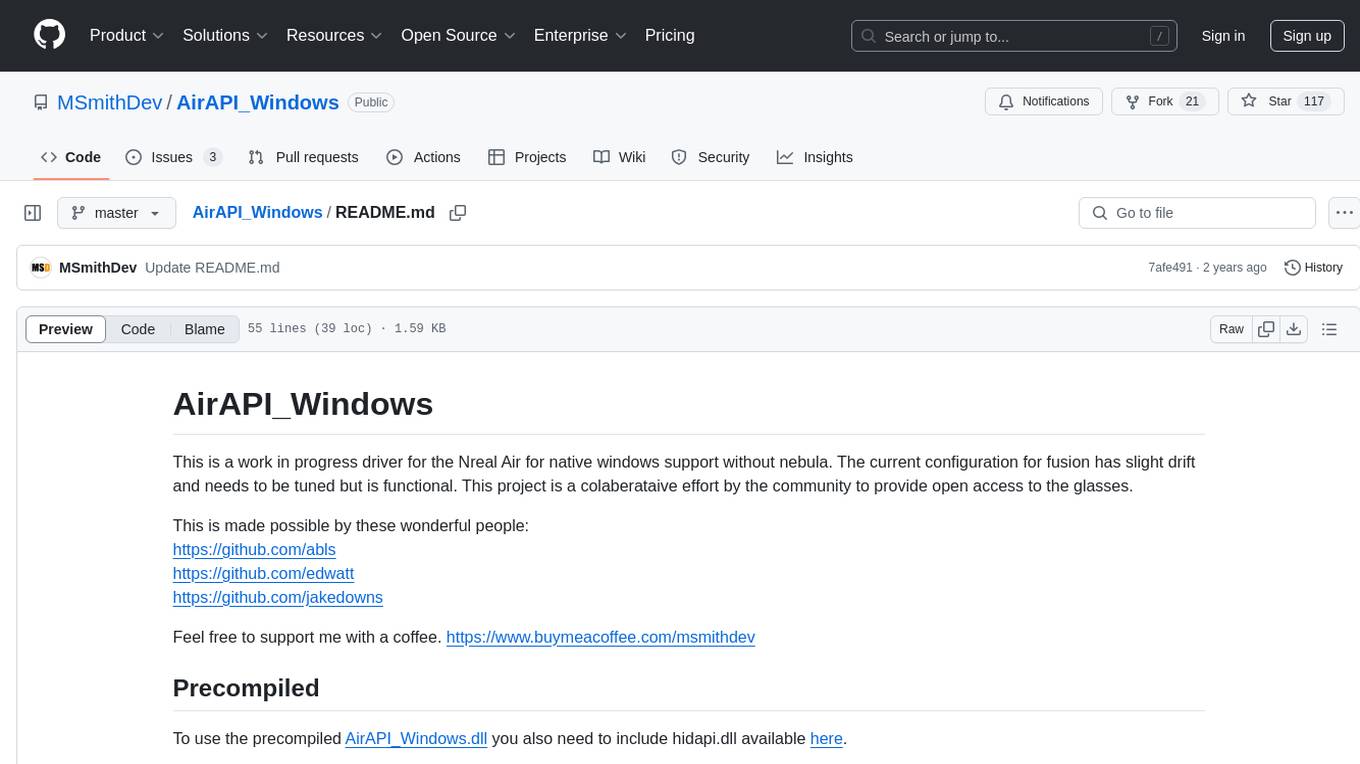
AirAPI_Windows
AirAPI_Windows is a work in progress driver for the Nreal Air glasses, providing native windows support without nebula. The project aims to address slight drift in fusion configuration and is a collaborative effort by the community to offer open access to the glasses. Users can access precompiled AirAPI_Windows.dll along with hidapi.dll for usage. The tool allows building from source, including getting hidapi, cloning the project, and building Fusion and AirAPI_Windows DLL. The project is supported by contributors like abls, edwatt, and jakedowns, and users can show appreciation by buying a coffee for msmithdev.
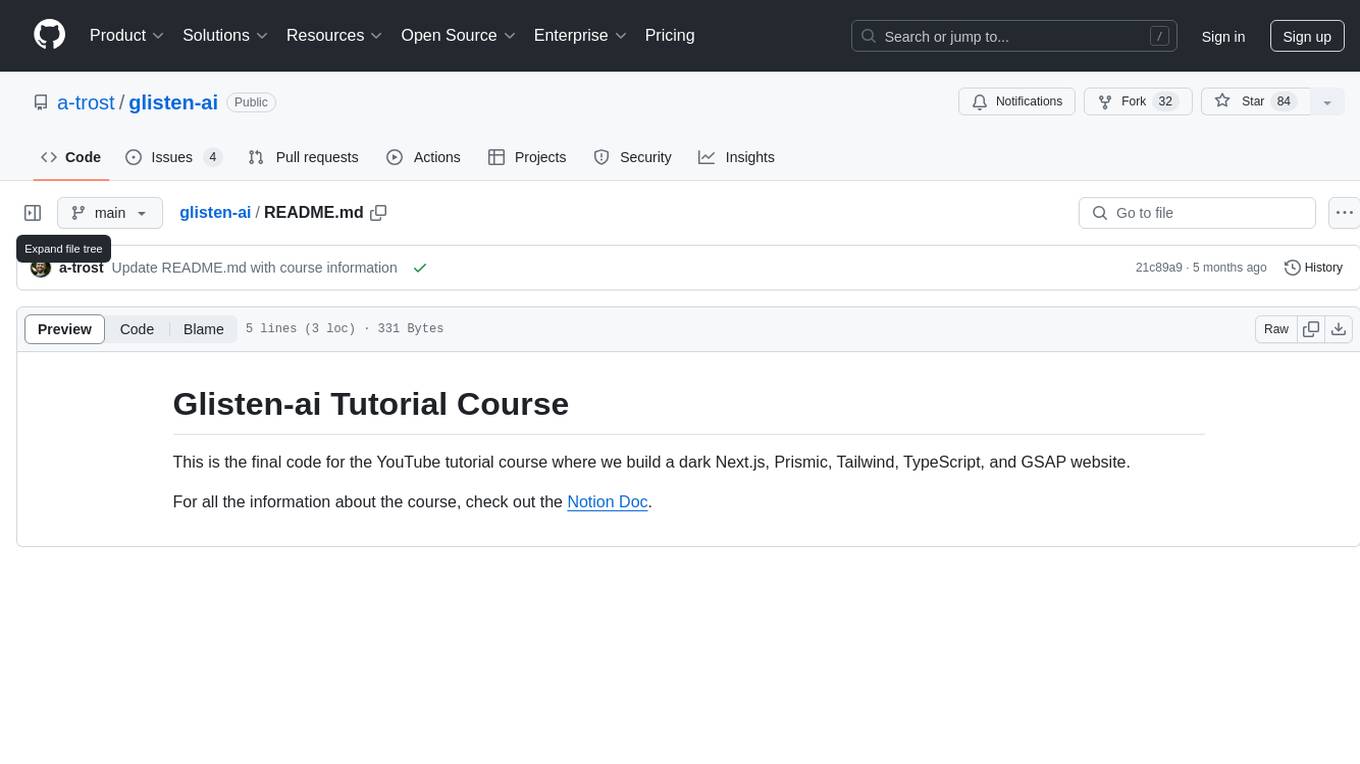
glisten-ai
Glisten-ai Tutorial Course is the final code for a YouTube tutorial course demonstrating the creation of a dark Next.js, Prismic, Tailwind, TypeScript, and GSAP website. The repository contains the code used in the tutorial, providing a practical example for building websites using these technologies.
For similar jobs
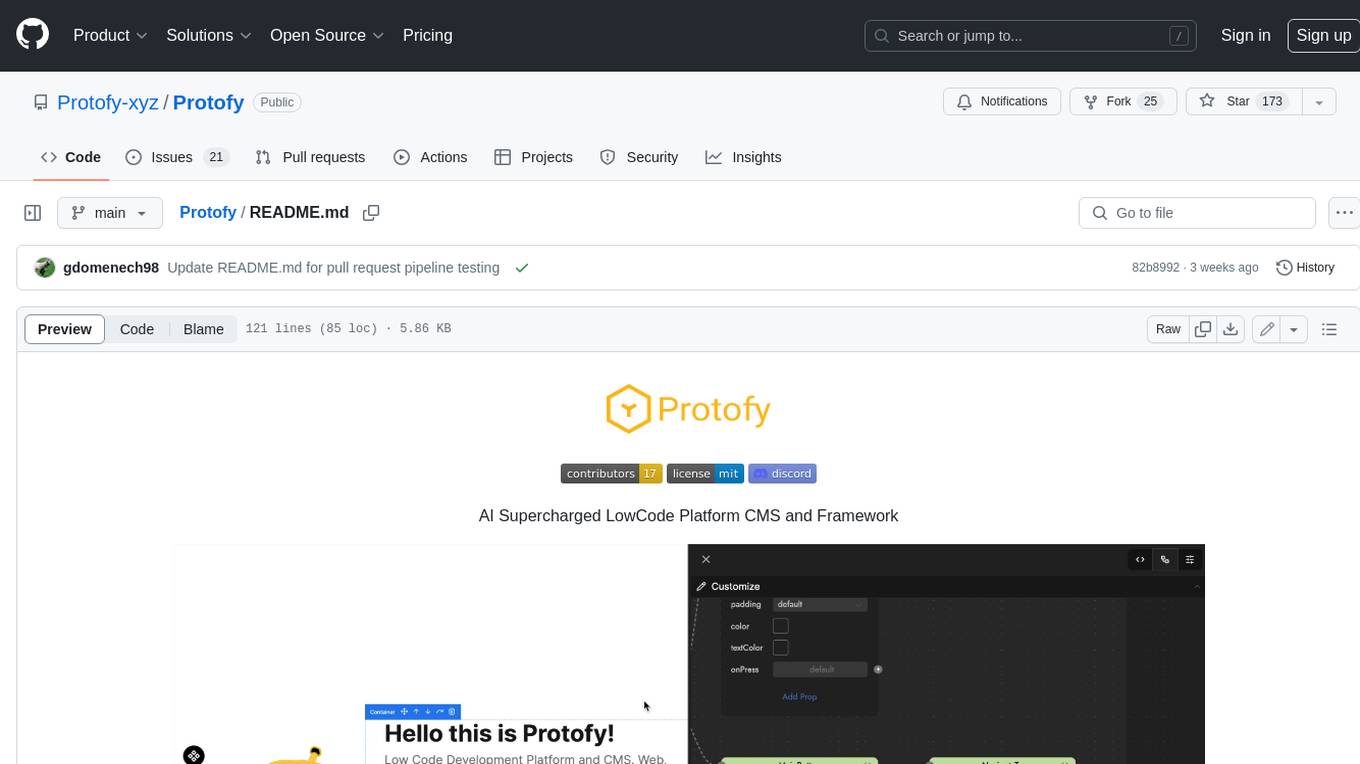
Protofy
Protofy is a full-stack, batteries-included low-code enabled web/app and IoT system with an API system and real-time messaging. It is based on Protofy (protoflow + visualui + protolib + protodevices) + Expo + Next.js + Tamagui + Solito + Express + Aedes + Redbird + Many other amazing packages. Protofy can be used to fast prototype Apps, webs, IoT systems, automations, or APIs. It is a ultra-extensible CMS with supercharged capabilities, mobile support, and IoT support (esp32 thanks to esphome).
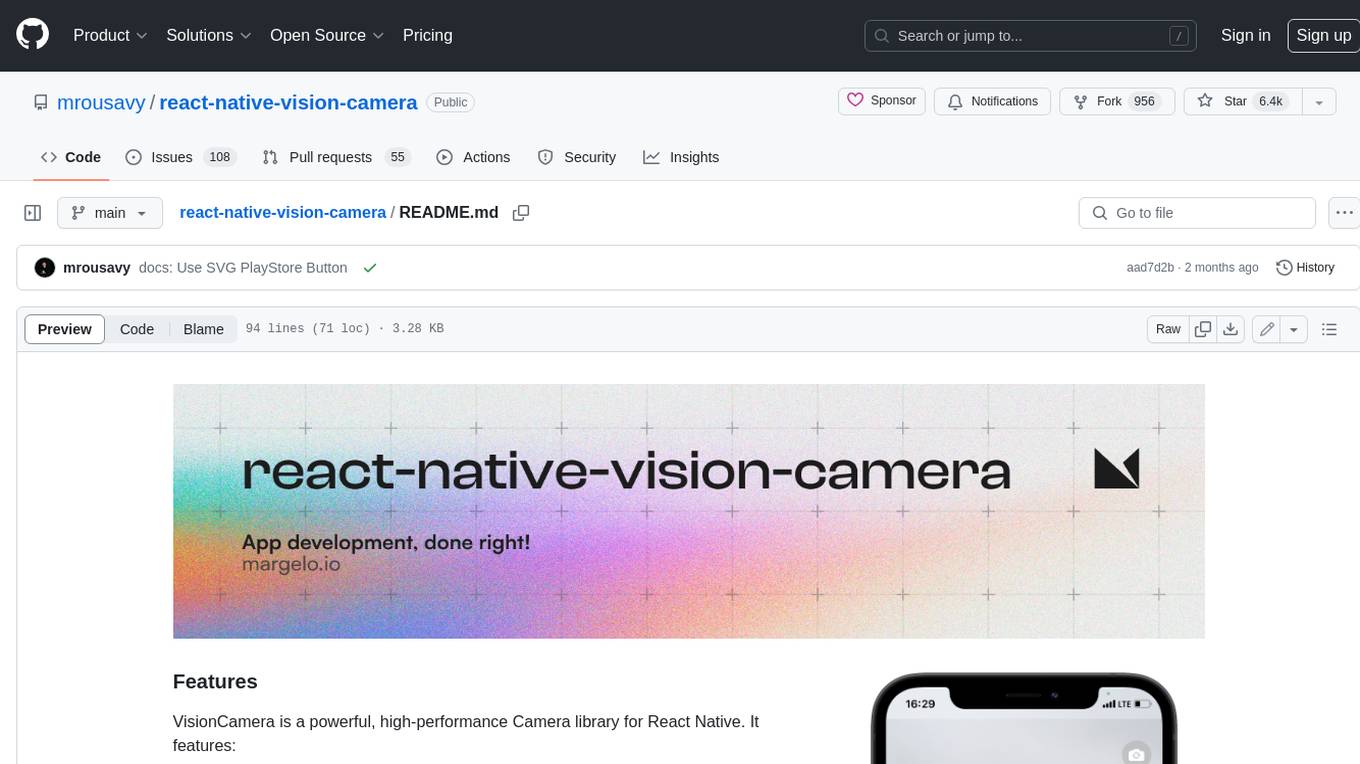
react-native-vision-camera
VisionCamera is a powerful, high-performance Camera library for React Native. It features Photo and Video capture, QR/Barcode scanner, Customizable devices and multi-cameras ("fish-eye" zoom), Customizable resolutions and aspect-ratios (4k/8k images), Customizable FPS (30..240 FPS), Frame Processors (JS worklets to run facial recognition, AI object detection, realtime video chats, ...), Smooth zooming (Reanimated), Fast pause and resume, HDR & Night modes, Custom C++/GPU accelerated video pipeline (OpenGL).
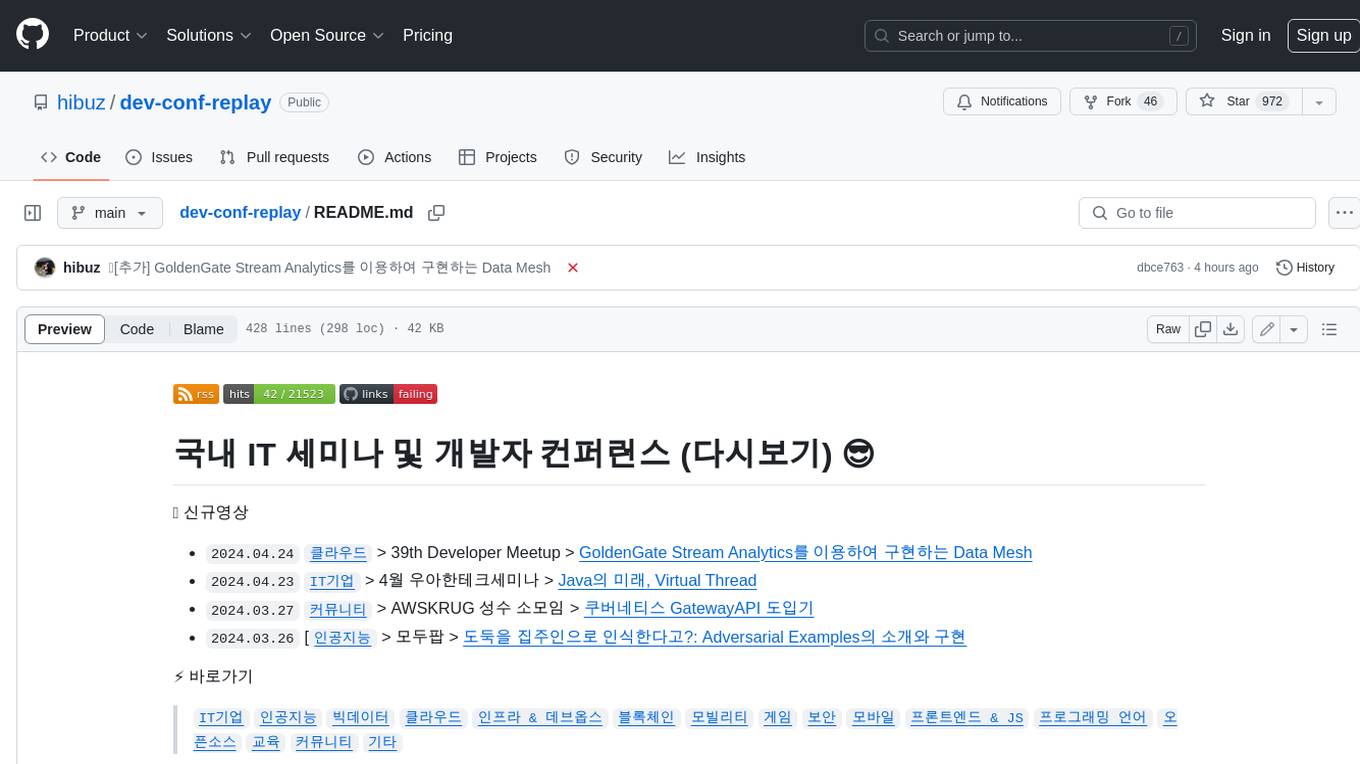
dev-conf-replay
This repository contains information about various IT seminars and developer conferences in South Korea, allowing users to watch replays of past events. It covers a wide range of topics such as AI, big data, cloud, infrastructure, devops, blockchain, mobility, games, security, mobile development, frontend, programming languages, open source, education, and community events. Users can explore upcoming and past events, view related YouTube channels, and access additional resources like free programming ebooks and data structures and algorithms tutorials.
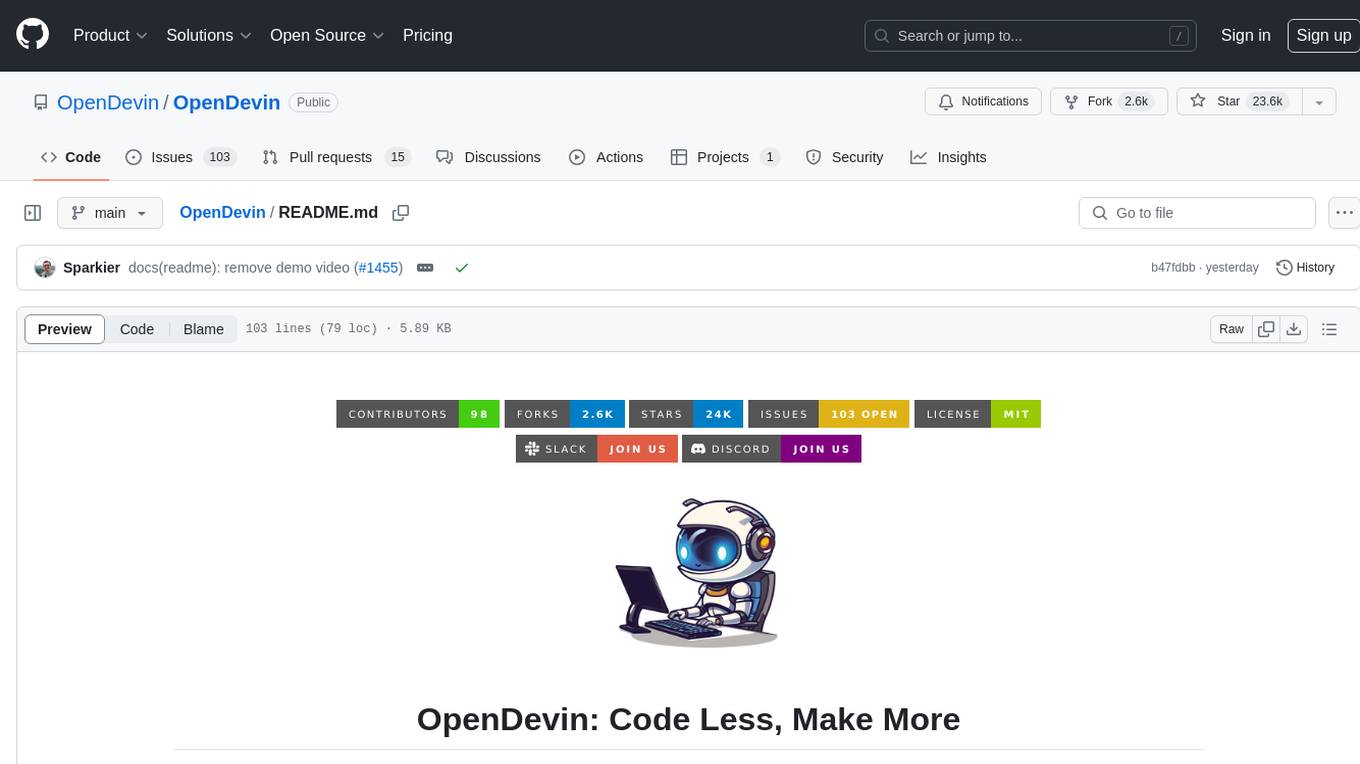
OpenDevin
OpenDevin is an open-source project aiming to replicate Devin, an autonomous AI software engineer capable of executing complex engineering tasks and collaborating actively with users on software development projects. The project aspires to enhance and innovate upon Devin through the power of the open-source community. Users can contribute to the project by developing core functionalities, frontend interface, or sandboxing solutions, participating in research and evaluation of LLMs in software engineering, and providing feedback and testing on the OpenDevin toolset.
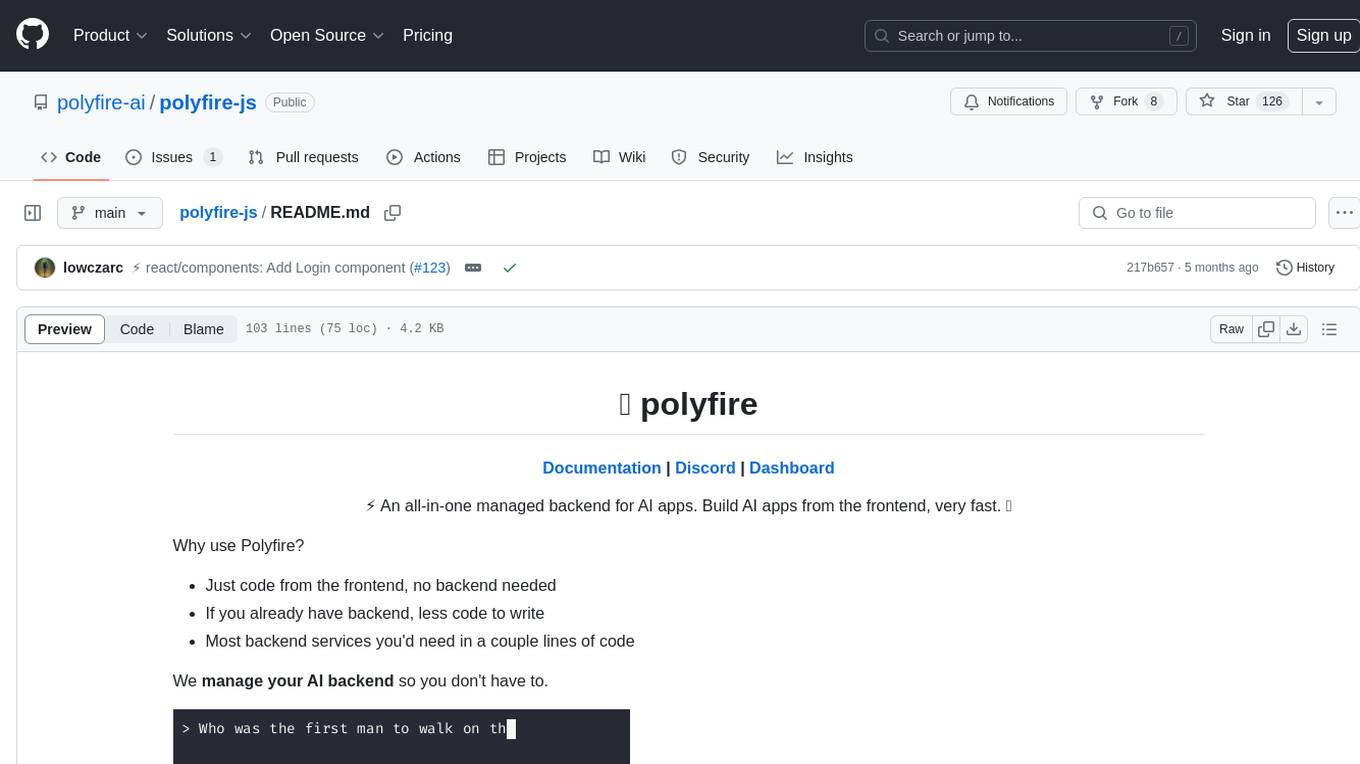
polyfire-js
Polyfire is an all-in-one managed backend for AI apps that allows users to build AI applications directly from the frontend, eliminating the need for a separate backend. It simplifies the process by providing most backend services in just a few lines of code. With Polyfire, users can easily create chatbots, transcribe audio files, generate simple text, manage long-term memory, and generate images. The tool also offers starter guides and tutorials to help users get started quickly and efficiently.
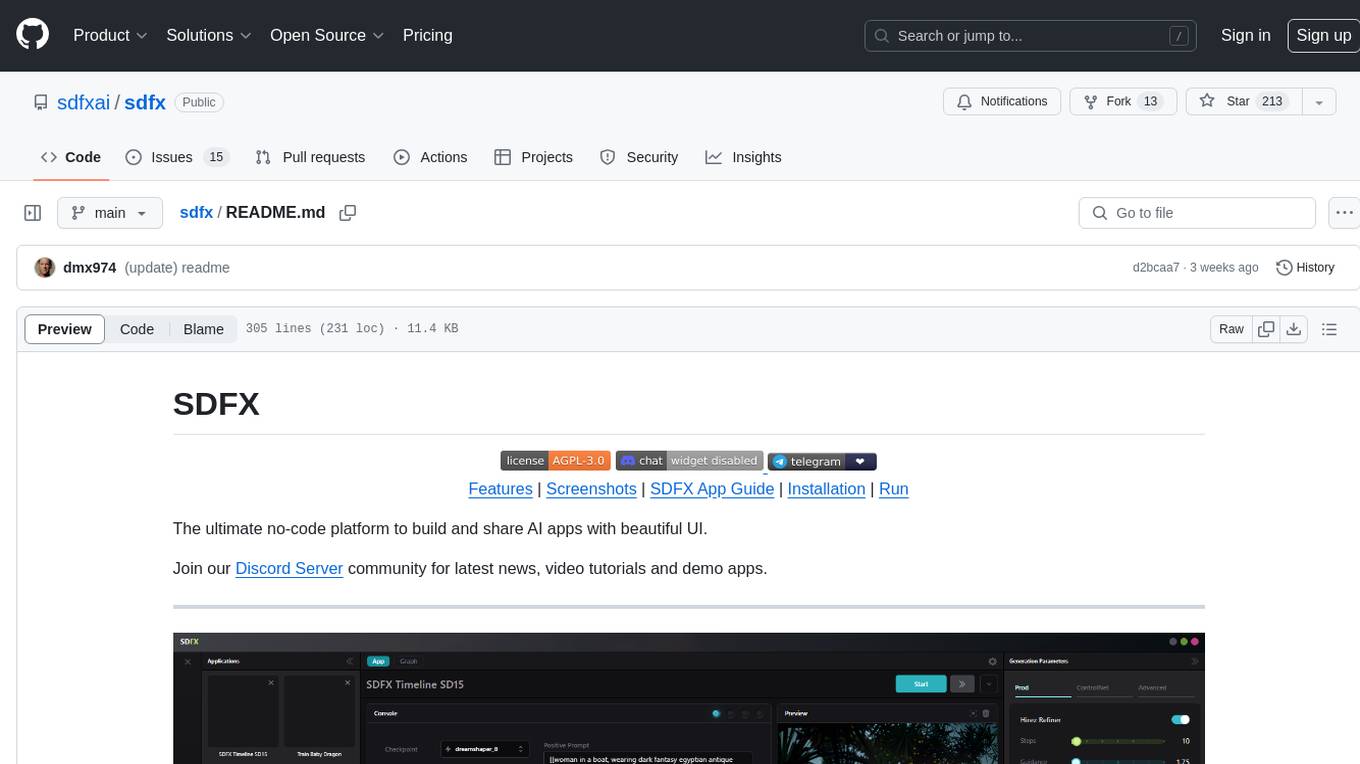
sdfx
SDFX is the ultimate no-code platform for building and sharing AI apps with beautiful UI. It enables the creation of user-friendly interfaces for complex workflows by combining Comfy workflow with a UI. The tool is designed to merge the benefits of form-based UI and graph-node based UI, allowing users to create intricate graphs with a high-level UI overlay. SDFX is fully compatible with ComfyUI, abstracting the need for installing ComfyUI. It offers features like animated graph navigation, node bookmarks, UI debugger, custom nodes manager, app and template export, image and mask editor, and more. The tool compiles as a native app or web app, making it easy to maintain and add new features.
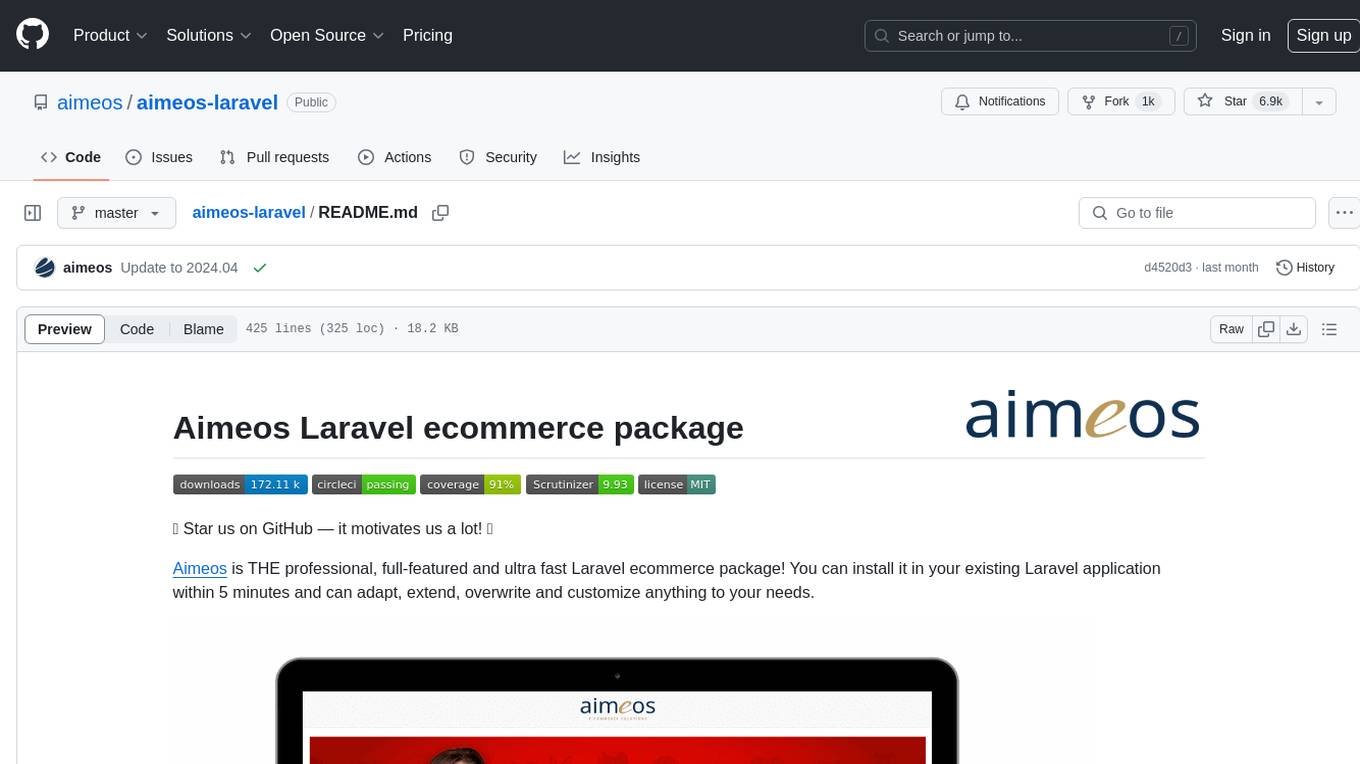
aimeos-laravel
Aimeos Laravel is a professional, full-featured, and ultra-fast Laravel ecommerce package that can be easily integrated into existing Laravel applications. It offers a wide range of features including multi-vendor, multi-channel, and multi-warehouse support, fast performance, support for various product types, subscriptions with recurring payments, multiple payment gateways, full RTL support, flexible pricing options, admin backend, REST and GraphQL APIs, modular structure, SEO optimization, multi-language support, AI-based text translation, mobile optimization, and high-quality source code. The package is highly configurable and extensible, making it suitable for e-commerce SaaS solutions, marketplaces, and online shops with millions of vendors.
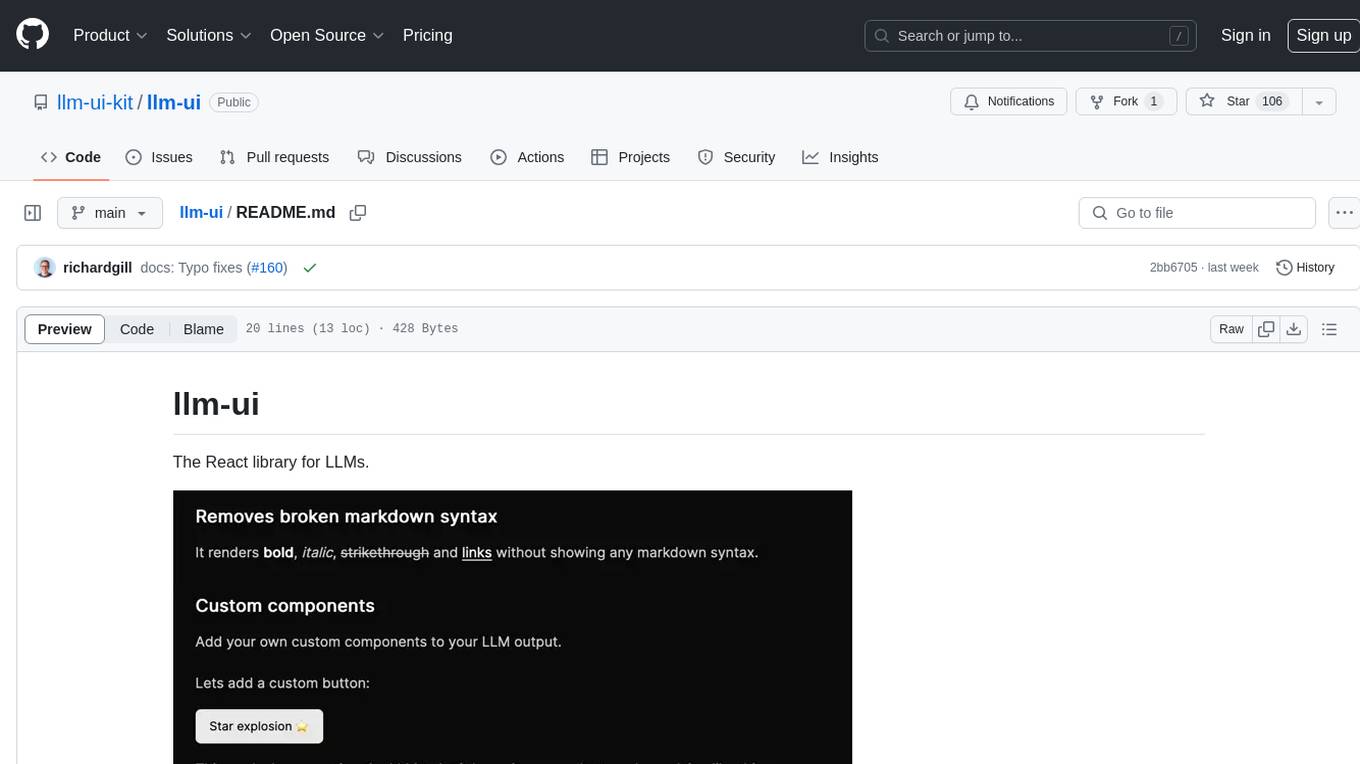
llm-ui
llm-ui is a React library designed for LLMs, providing features such as removing broken markdown syntax, adding custom components to LLM output, smoothing out pauses in streamed output, rendering at native frame rate, supporting code blocks for every language with Shiki, and being headless to allow for custom styles. The library aims to enhance the user experience and flexibility when working with LLMs.
